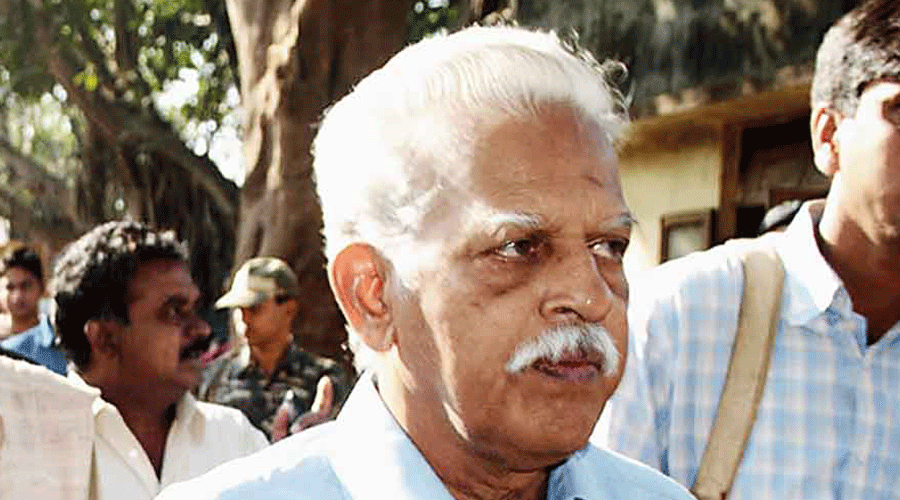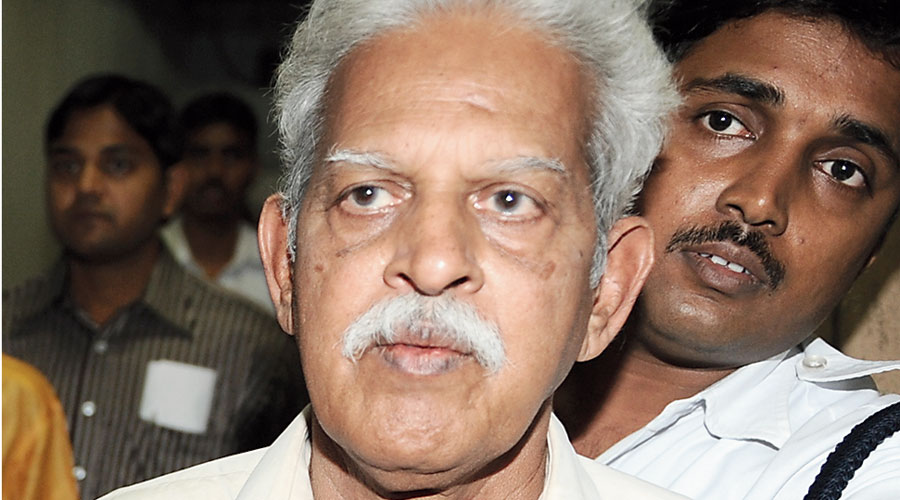The Supreme Court on Wednesday granted regular bail to poet Varavara Rao, 82, in the Bhima-Koregaon case considering his advanced age and ailments, rejecting the NIA’s argument that age cannot be a ground for relief “if the crime is heinous” and that he was not seriously unwell.
Rao, who was arrested on August 28, 2018, and is out on interim bail on medical grounds, had pleaded with the court “that any further incarceration would ring the death knell” for him and feared that he would meet the same fate as Father Stan Swamy, another accused in the Elgaar Parishad case, who died in July 2021 while awaiting bail.
The bench of Justices U.U. Lalit, Aniruddha Bose and Sudhanshu Dhulia noted that Rao’s medical condition had not improved during his period in custody, as claimed by the NIA, and as such “…in the totality of circumstances, the appellant is entitled to bail”.
The court pointed out that even the charges were yet to be framed.
“Look at his age as well. Normal tendency is that when a person is suffering from such diseases, the condition might aggravate and not improve,” Justice Lalit said.
Additional solicitor-general S.V. Raju, representing the NIA, replied: “His condition has improved.”
Rao had sought regular bail as it does not come with the conditions attached to interim bail, such as that the person would return to jail once the reason for which bail was sought has been fulfilled. The NIA’s argument was that Rao’s health had improved, so interim bail on medical ground was no longer relevant.
Raju said Rao had been booked under the anti-terror law UAPA and that “the age of the accused cannot be a factor. He is involved in serious and nefarious activities against the State. He is trying to overthrow the democratically elected government.”
The bench observed: “There may be a few people who are in the pink of their health at 82, good for them, but this is not the case. Why should he not be allowed (bail)?”
Raju reasoned: “Age is required to be considered in some cases but in this case, age cannot be a factor if the crime is heinous. He is not a normal criminal.”
However, the bench said the NIA had not placed on record any material to show that Rao had misused the interim bail granted to him.
The apex court asked Raju when the case had been handed over to the NIA. When the law officer said the NIA had taken over the investigation in February 2020, the bench asked: “Why so much of a delay?”
The court observed that the moment there was a charge under the UAPA, the state was obliged to report it to the central government.
Senior advocate Anand Grover, appearing for Rao, argued that the entire case against the accused was based on certain electronic evidence and the trial was yet to start.
“There is nothing on record that he misused his liberty that was granted…. I (Rao) am a poet. I am a writer. I have been cooperating in all the investigations. It is in their interest that I should not die in jail. I am prepared to stand trial but why should my liberty be removed? Who is going to gain if I die?” Grover asked.
He submitted that even if the trial were to start now, it would take a minimum of 10 years. Grover pointed out that Rao was 82 and ailing.
Rao has cited multiple health complications like Parkinson’s disease, coronary artery disease, hypertension, brain atrophy with brain ischaemia, cerebral cortical atrophy, migraine and sinusitis, piles, prostrate enlargement, oedema and vertigo.
“…Any further incarceration would ring the death knell for him as advancing age and deteriorating health are a fatal combination,” Rao’s bail plea had stated while arguing that due to his prolonged incarceration “there is every likelihood that he would not survive”.
Raju said that Rao’s medical report “doesn’t show any evidence for Parkinson’s” and that he was only displaying Covid symptoms. “He is able to do his normal daily things. Nothing serious, that is what I’m pointing out,” Raju said.
Another of Rao’s lawyers, Satyanarayan Iyer, told the news agency PTI in Mumbai after Wednesday’s court verdict: “Rao’s health is still not that good. He is suffering from various ailments. He is relieved and happy with the Supreme Court order making his medical bail permanent.”
Rao, whose hometown is Hyderabad, has been living in Mumbai since he was granted temporary medical bail by Bombay High Court for the first time in February 2021. That interim bail had since been extended multiple times by the high court.
“Earlier, he was living in suburban Bandra. Since March 2022, he has shifted to a rented place in suburban Goregaon. His family members, who are in Hyderabad, keep visiting him,” Satyanarayan said.
The case against Rao and others relates to alleged inflammatory speeches made at an Elgaar Parishad conclave in Pune on December 31, 2017, which police claimed triggered caste violence the next day near the Koregaon-Bhima war memorial on the outskirts of the Maharashtra city in which one person died.
The Pune police had claimed that the conclave was organised by people with Maoist links.
Rao, who had been lodged in Mumbai’s Taloja central jail, had been granted three months’ interim bail extension on medical grounds by Bombay High Court in April this year. After his plea for regular bail was turned down, Rao moved a special leave petition in the Supreme Court.
With the bail period coming to an end, the Supreme Court had in July extended it till August 10. On Wednesday, it granted Rao regular bail.
Justice Lalit, who dictated the order, directed that Rao shall not leave the vicinity of Greater Mumbai without permission from the special NIA court and shall not misuse his liberty or influence witnesses.
The bench clarified that Rao was being granted bail solely on medical grounds and that this should not be construed as a reflection on the merits of the case.












